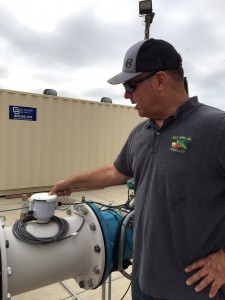The Fox Canyon Water Market pilot program is the only formal centralized market that allows individual landowners to buy and sell groundwater in California. The idea for the market comes from Matthew Fienup, executive director of the Center for Economic Research and Forecasting (CERF) at California Lutheran University and Edgar Terry, CEO of Terry Farms and senior adjunct professor at Cal Lutheran.
“As a grower you are given an allotment of water, that allotment of water may be enough or it may not be enough, but either way if it’s not enough you would be able to buy water from someone else to finish your crops,” Terry said.
The market requires farms to install automated metering systems tracking groundwater usage. Then, the information is sent to a custom data portal created by Ranch Systems LLC. The portal shows an aerial view of all the wells enrolled in the water market and can see how much they have pumped, their fixed allocation and how much is available to trade.
Groundwater is water found in cracks below the surface, and accounts for 63 percent of Ventura County’s water needs, according to statistics from the Ventura County Watershed Coalition website.
“The unit here is an acre foot so imagine one acre of ground and putting one foot of water over that entire acre, that’s the unit that trades in the market,” Fienup said.

Photo by Nicki Schedler – Reporter
The program was awarded a $1.9 million conservation innovation grant in June from the Natural Resource Conservation Service, an agency of the Department of Agriculture. The grant was proposed to offset the cost of metering their water, and an incentive to join the pilot market.
“The reality is, if we don’t create financial incentives that drive conservation and creation of new water supplies, and if we don’t give farmers flexibility to move water between users, the viability of agriculture is in doubt,” Fienup said.
Once the program begins phase two in October, farmers can contact Fienup for transactions and remain anonymous from one another. Terry said anonymity keeps the market intact and prevents double dealing.
The market helps farmers respond to the Sustainable Groundwater Management Act (SGMA) which sets guidelines for groundwater management and sustainability in California, according to the University of California Davis Division of Agriculture and Natural Resources.
John Krist, CEO of the Ventura County Farm Bureau, said that the market would work to help farmers prepare for the regulatory changes to come with the SGMA.
“It gives people incentives to address both supply and demand sides and the flexibility to cope with it in a way that best suits their operation,” Krist said.
The amount of water that farms in the program receive comes from the Fox Canyon Groundwater Management Agency (FCGMA), which preserves and manages groundwater in the southern portion of Ventura County.
The region accounts for about half of the 2,150 farms in Ventura County, said Arne Anselm, deputy director of water resources for the Ventura County Watershed Protection District.
The pilot is set to become a permanent market in October 2018 and join other water sustainability techniques in Ventura County such as desalinization and water recycling.
“The great thing about the system is it’s only willing participants,” Krist said. “If you don’t want to sell or buy in the market you don’t have to.”
Nicki Schedler
Reporter


